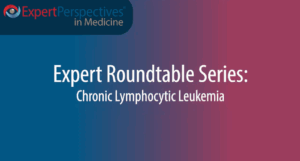Oncology
Chronic Lymphocytic Leukemia
Behavioral Interventions for Patients With Chronic Lymphocytic Leukemia
In my experience, CLL has a significant emotional impact on patients that is often increased by confusion surrounding the diagnosis. Many individuals are told that they have leukemia but that the plan is to “watch and wait” rather than do anything to treat it. I have seen many patients struggle to understand this concept, and it can have a significant impact on their mental health and can lead them to worry constantly about the future. Moreover, some patients with CLL may be at a higher risk for having emotional consequences from their diagnosis than others, and I believe that it is very important to identify such patients and refer those who are at high risk of severe emotional impact to a specialized provider.
<br>
At our center at The University of Texas MD Anderson Cancer Center, we have a comprehensive survivorship initiative that we offer to patients with CLL. All patients are considered “cancer survivors” if they have a diagnosis of cancer. We recommend a visit to the leukemia survivorship clinic at least once per year, and one topic that we cover is self-education. We also recommend to our patients with CLL that they limit the amount of time they spend researching their disease, particularly online, because this can have a big impact on their stress levels. We encourage them to only explore validated sources, and we make recommendations for well-run support groups and virtual discussion forums. These resources can help in creating a support system for patients and family members. At our survivorship clinic, we also assess for distress, including distress related to CLL, relationships, and finances, and make referrals, when appropriate.
<br>
Screening for other cancers is another important aspect of survivorship care that can help improve the health and well-being of patients with CLL. Individuals with CLL are at a higher risk for developing other cancers, so we are very meticulous about keeping them up to date on cancer screening tests such as colonoscopies, mammograms, and prostate-specific antigen testing. We also take time to review the patients’ immunization records and stress the importance of immunization because patients with CLL are immunosuppressed.
<br>
In addition, we discuss the importance of incorporating exercise and diet into the daily routine activities. Our group conducted the HEALTH4CLL study, a behavioral intervention study in which individuals with CLL were coached to increase their activity levels. The study also provided diet, body weight management, and exercise education. We found that patients had significantly reduced fatigue and that the intervention may have had a positive effect on the immune system. We have since initiated a new ongoing study called HEALTH4CLL2 to further assess the impact of the type of interventions that worked best in HEALTH4CLL on the fatigue levels and well-being of patients with CLL.
Arrato NA, Valentine TR, Byrd JC, et al. Illness representations and psychological outcomes in chronic lymphocytic leukaemia. Br J Health Psychol. 2022;27(2):553-570. doi:10.1111/bjhp.12562
<br>
ClinicalTrials.gov. HEALTH4CLL2: a randomized waitlist control trial of behavioral interventions in patients with chronic lymphocytic leukemia. Updated April 23, 2025. Accessed July 9, 2025. https://clinicaltrials.gov/study/NCT05879133
<br>
Cox-Kennett N. An approach to anxiety during watch-and-wait for chronic lymphocytic leukemia: monitor and move on. Can Oncol Nurs J. 2023;33(4):475-479.
<br>
Crane JC, Gordon MJ, Basen-Engquist K, et al. Relationships between T-lymphocytes and physical function in adults with chronic lymphocytic leukemia: results from the HEALTH4CLL pilot study. Eur J Haematol. 2023;110(6):732-742. doi:10.1111/ejh.13958
<br>
Lee CY, Gordon MJ, Markofski MM, et al. Optimization of mHealth behavioral interventions for patients with chronic lymphocytic leukemia: the HEALTH4CLL study. J Cancer Surviv. Published online March 13, 2024. doi:10.1007/s11764-024-01555-w
<br>
Major A, Wright R, Hlubocky FJ, Smith SM, Prochaska MT. Longitudinal assessment of quality of life in indolent non-Hodgkin lymphomas managed with active surveillance. Leuk Lymphoma. 2022;63(14):3331-3339. doi:10.1080/10428194.2022.2123225
<br>
Morrison EJ, Flynn JM, Jones J, Byrd JC, Andersen BL. Individual differences in physical symptom burden and psychological responses in individuals with chronic lymphocytic leukemia. Ann Hematol. 2016;95(12):1989-1997. doi:10.1007/s00277-016-2790-z
<br>
Newcomb RA, Johnson PC, Yang D, et al. Coping and perception of prognosis in patients with indolent non-Hodgkin’s lymphoma. Oncologist. 2024;29(5):441-449. doi:10.1093/oncolo/oyad295
<br>
Trevino KM, Martin P, Chen Z, Leonard JP. Worsening quality of life in indolent non-Hodgkin lymphoma and chronic lymphocytic leukemia patients in active surveillance: a 12-month longitudinal study. Clin Lymphoma Myeloma Leuk. 2022;22(2):82-88. doi:10.1016/j.clml.2021.08.001











